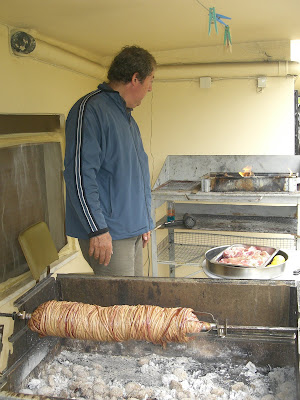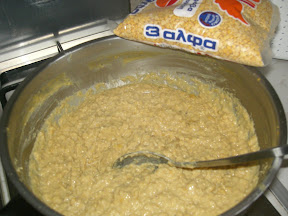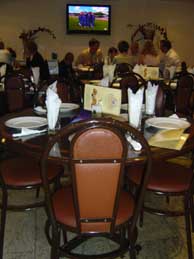On the occasion of my birthday, I proudly present you with a personalised version of the 'five-minute interview', based on the same questions asked to Nigella Lawson in a BBC interview with her, which, sadly, I can't embed here for your amusement, because the beeb is quite particular about who copies what from them, and I wonder what they'll have to say about seeing me copy most of their interviewer's questions. The funny thing is that 90% of the time, I'm giving the same answers as Nigella, which may be taken as firm evidence that celebrity chefs are no different to ordinary people. For maximum enjoyment, open Nigella's interview in another window, and listen to it, then read my one. Some questions have had to be modified appropriately. Matthew: (
being led by me into my kitchen) What an honour! So
this is where all the action takes place!
Mrs Organically Cooked: Hmm... my kitchen is practically my office.
 The kitchen
The kitchen: I thought it would be a bigger kitchen, actually.
Mrs Organically Cooked: Well, I'm not a big person myself, am I, but I'm certainly not a 'small woman', either, so this space is just right for me. At least that's what I understand when I'm in the classroom which is my normal work environment, I make my presence known there; my English students know just where to locate me, if you know what I mean.
Matthew: So, do people judge you a lot before they meet you, do you think?
Mrs Organically Cooked: Well, the ones that have been talking to my husband before they see me always say, "Oh, you're not as fat as I thought you'd be," which makes me wonder just how fat he makes out that I am when he talks about me.
 Mr OC, cooking his favorite meal (BBQ)
Mr OC, cooking his favorite meal (BBQ): OK, Maria, I've been thinking about setting you a challenge. I want you to name one favorite dish per minute.
Mrs Organically Cooked: (
staring at the cameraman) Oh, er, starting now?
Matthew: No, we haven't started yet, and you're already flirting with the camera, aren't you?
Mrs Organically Cooked: No, I'm just checking to see if the record button is working.
Matthew: OK, let's start then, so, Maria, what is your favorite dish?
Mrs Organically Cooked: My favorite dish -
pad thai, made with organic Chinese rice noodles, and whatever's in my storage cupboards and fridge.
 If you can't get it made for you, you have to cook it up yourself - pad thai, a la moi.
If you can't get it made for you, you have to cook it up yourself - pad thai, a la moi.: And what is your naughtiest kitchen secret?
Mrs Organically Cooked: Don't have one, sorry. There aren't any secrets in this house.
Matthew: (
in an insistent tone) You must have one.
Mrs Organically Cooked: Well, let me think, I suppose the only thing that I'm ashamed to admit is that I don't cook every day, which is something that most people assume I do, and since we eat takeaways only every now and then, I suppose that means that I'm always serving up meals cooked from earlier in the week, or that I've made from scratch and frozen to be used on a day when I can't be bothered cooking, which is like every second day, at this rate.
Matthew: Do you yourself ever eat takeaways?
Mrs Organically Cooked: Oh yes, 'course I do.
I grew up on the stuff, remember? And who doesn't love a really good
souvlaki every now and then? If good cheap Asian takeaways were available in my neck of the woods, I'd have those too, so maybe I wouldn't make
pad thai from scratch so often.
Matthew: Do you ever eat in bed?
Mrs Organically Cooked: No, never, it's not a Cretan thing, if you get my gist. Cretans don't eat in bed, the dust in our lives is bad enough without the olive oil stains in every room of the house... and anyway, most people don't have a sit-down
breakfast, which is the classic in-bed meal according to you Brits, isn't it? No, breakfast in bed is out of the question.
Breakfast is always a sit-down meal in our kitchen, and you'll only ever find me in bed when no one's wanting me to prepare any food for them.
Matthew: Now, we all know your husband's a keen hunter, and...
Mrs Organically Cooked: Mmm.
Matthew: So, do you have--
Mrs Organically Cooked: No, before you start I'm gonna say--
Matthew: -- a favorite game meat,
a favorite hunting ground, ...
Mrs Organically Cooked:
Hare.
 Mr OC indulges in a bit of this every now and then - trigonia caught in Paleohora.
Mr OC indulges in a bit of this every now and then - trigonia caught in Paleohora.: -- a passion for hunting?
Mrs Organically Cooked: (
deep breath) It's interesting to enter a different world, but I don't really like to get led down commenting-type paths on the moral rights of hunting or environmental issues.
Matthew: We're well into the second half of the interview, so...
Mrs Organically Cooked: Yes, I know, you've just wasted a part of the interview talking about my husband, haven't you?
Matthew: (
laughing) Yes, I know, I'm sorry.
Mrs Organically Cooked: That's OK.
Matthew: Another favorite dish?
Mrs Organically Cooked: Tandoori chicken with curried rice and vegetables.
Matthew: (
looking perplexed) Do you eat that a lot?
Mrs Organically Cooked: Only when I go to
London. I don't have a tandoori oven in my house.
Matthew: Do you read a lot?
Mrs Organically Cooked: Yes, I do, naturally, I've always read a lot, and the whole family complains that when they beg me to come and sit in the living room and watch a movie altogether as a family, they say I'm only pretending to do this, because I always come with reading material in my hands.
 A very small section of my cookbook library - my general library is overflowing...
A very small section of my cookbook library - my general library is overflowing...: And you write of course, but you started off having a very different career, a very serious career, ...
Mrs Organically Cooked: Hmm, ...
Matthew: ... a
fairly serious career, an English teacher, ...
Mrs Organically Cooked: ... mm, yes, ...
Matthew: ... well,
quite a serious career.
Mrs Organically Cooked: Well, food is also serious too, isn't it, but, OK, I take your point entirely.
Matthew: Are you very organised?
Mrs Organically Cooked: Well, I'm not as organised as I used to be when I was an English teacher, because, admittedly, I was paid to be organised, but I know I'm now discussing subjects like the ones I used to discuss in my evening classes with children, teenagers and young adults, but I just can't remember which view I took back then (
Matthew chuckles), and these days, anyway, the members of my family interrupt my organised schedule with coughs and colds, emergencies, after-school activities, tasks, chores, and of course, meal requirements, and the older I get, the harder it is to be organised, so I just try to attain a level of organisation just before the highest Richter scale chaos level, and I can keep on top of things.
Matthew: OK, this is probably a difficult question, but is there anything tongue-in-cheek about the way you write about certain topics or present various characters in your stories?
Mrs Organically Cooked: Well, I don't think so, because I believe
that my regular readers are intelligent people who know that many times they have to read between the lines in what I write. I don't mean to be tongue-in-cheek, maybe ironic sometimes, I know that sounds odd, but at least I'm openly ironic, I'm not trying to be coy and I'd never want anyone to think I was being offensive on purpose in any way.
Matthew: When you're in the kitchen, you're very flirtatious, coquettish, aren't you?
*Mrs Organically Cooked: Thank you. And attractive, right?
Matthew:
(laughing) Oh, I forgot to add that!
Mrs Organically Cooked: Well, most Greek women, in any case, are very flirtatious, sexy and coquettish, and it's never been easier to do that than in our times, so I think it's just a matter of how much money each one of us devotes to such matters. All women know when the moment calls for any of these qualities, and it really doesn't take much to win a man's heart when he watches a woman cooking. My husband loves to do this, and he especially gets worked up when I try to shoo him
out of the kitchen. In Greek, we have a saying: love passes through a man's stomach.
Matthew: I'm not sure if we've had another favorite dish...
Mrs Organically Cooked:
Fava, the Greek yellow split-pea dip, with lots of thinly sliced raw onions, finely chopped parsley and
shrimps cooked in lemon juice.

 Greek fava and shrimps
Greek fava and shrimps: Do you have any food hates?
Mrs Organically Cooked: No, unfortunately, and sometimes I wish I did, so that I could stop myself from eating whatever is offered to me.
Tofu, perhaps, but that's not available where I live, so it doesn't really count as food, does it?
Matthew: I won't be the judge of that!
Mrs Organically Cooked: I don't like tofu. And soy meat. And soy mince. But I'd still eat them if I was offered them.
Matthew: Do you... eat a lot of fruit?
Mrs Organically Cooked: I eat a lot of everything, I'm afraid. It shows, doesn't it?
Matthew: There are a lot of noises in the background, aren't there?
Mrs Organically Cooked: Well, when you have children in the house, there are always a lot of noises in a house.
 Where there are kids, there is noise; on a recent trip to the Acropolis.
Where there are kids, there is noise; on a recent trip to the Acropolis.: You're a very attractive woman, and you're a very real woman...
Mrs Organically Cooked: (
looking down her blouse) Oh yes, my
watermelons are definitely real.**
Matthew: ... and you send out signals to society that you don't have to be skinny to be attractive.
Mrs Organically Cooked: That's a difficult thing to comment on. All women worry about their weight, but it's wrong to assume that the thinner you are, the more attractive you are. That's really all about fashion codes, which differ across time periods, cultures and races. If I were desperate to look like a fashion model, I could take up the 'free' Bodyline offers that I regularly get called for via telemarketing, but if I do that, then I would have to give up time from doing other things that I enjoy doing, like writing, and eventually the free offers would become paid offers, because there really is no such thing as a free lunch, and since I've been used to stretching
an already tight budget, I wouldn't be able to indulge in what I call 'luxuries', like buying books and DVDs online, or setting aside some money for a domestic or overseas holiday for all the family. I know I can't have everything, so I just settle for some things.
Matthew: So you're not a slave to fashion?
Mrs Organically Cooked: Anyone who knows me can vouch for the fact that I don't even know what the word 'fashion' means! Never was and never will be. Food and knowledge have always been more important in my life, and I can see they always will be.
Matthew: Are you sporty?
Mrs Organically Cooked: Tremendously. And if
you had watermelons growing on your chest, you'd be totally supportive of me. (
Matthew laughs) I'll never forget the one and only time when I was chosen as captain of the softball team at primary school, just because the teacher wanted to instil some confidence in me, and I had to choose my team from among my classmates, and everyone just let out a groan every time I picked them. The signal was loud and clear: butterfingers.
 A halved version of my current self being honoured for our win in the Sister Cities Dragonboat Race in Wellington some time at the end of the 1980s.
A halved version of my current self being honoured for our win in the Sister Cities Dragonboat Race in Wellington some time at the end of the 1980s.
: You had--
Mrs Organically Cooked: I have acted in the past as manager of the Wellington Greek Community Dragonboat racing team in the Sister Cities Dragonboat Race, but I never had to get into the boat myself, I just had to make sure our team won, and I did manage to succeed in doing that the couple of times I was manager. I used to lie to the team and tell them we had practice at 6.30am, even though I knew it was 7.00am, so I'd turn up at 6.50am, and they'd ask me why I told them to come so early, even though they had probably come at 6.45am and I'd tell them that if I had said to turn up at 7.00, they'd all be getting up at that time instead, because they were always running on
Greek time.
Matthew: What was it like being the daughter of Greek immigrants who owned
a fish shop in New Zealand?
Mrs Organically Cooked: Well, sometimes we were called 'greasy Greeks' by other children in playground taunts, and some kids would call me 'Maria Veryfarty' as a play on my name, but that was about all, because as a Greek girl, I didn't stand out in society. People couldn't guess my nationality if I were walking on the street, like they do with Asians, and sadly, nowadays,
Asian immigrants are targeted constantly in New Zealand, with racist comments and actions directed against them, and it's clearly obvious that skin colour is behind this, as might be the wearing of a hijab or a burkha, because you stand out against mainstream society, which upsets me a bit about New Zealand these days, because I never felt racially targeted against while I was growing up there, but when I went back only six years ago, even public figures like bus drivers were making blatantly racist comments in full public hearing against other drivers on the road about their driving habits, or even the passengers, like when they didn't have the right change for a ticket, or something trivial like that, and all just because they would pick up on their looks - they looked different - in other words, they were being judged by their skin colour, so I was quite shocked, to be honest. Racism is something I encountered more blatantly when I arrived in Greece, but what I hear here seems benign compared to what I was exposed to on NZ buses.
Matthew: So why do you think people read your blog?
Mrs Organically Cooked: Well, most people who land on my blog are looking for a specific Greek recipe, or a quintessential New Zealand one like afghans or pavlova, but my regular readers are probably more interested in the combination I present of Greek food and Greek life. I think the women come in for the recipes, while the men come in for the food, if you get what I mean...
Matthew: (
laughs) Well, the five minutes are almost up. So, tell me the secrets of your name, because I know it was your grandmother's name.
Mrs Organically Cooked: My paternal grandmother's name, yes, and since I was the first-born, traditionally, if you're a boy, you get your father's father's name, and if you're a girl, you get your father's mother's name, so I was called Maria. But my father could've given me his father's name if he wanted to, which was John, so I'd have been called Joanna, in the feminine, but he decided to honour his mother instead, which I'm glad about, because none of his brothers and sisters called any of their daughters Maria, and I remember it made my grandmother very happy. I suppose he thought the next one might have been a boy, so he'd still have a chance to give one of his children his father's name, but it didn't actually work out that way.
Matthew: Favorite dish, quick, time's almost up, another one!
Mrs Organically Cooked: Oh, aahhh, sausages and chips. And paua fritters with oysters, if I could ever get them here, but I can't.
Matthew: Well, it was lovely talking with you.
Mrs Organically Cooked: Nice to meet you, too.
* If I were really being interviewed, I suppose the interviewer would have said that anyway.
** Nigella didn't say this - but then her watermelons are considerably smaller than mine.
You can say a lot in five minutes, can't you?©All Rights Reserved/Organically cooked. No part of this blog may be reproduced and/or copied by any means without prior consent from Maria Verivaki.



